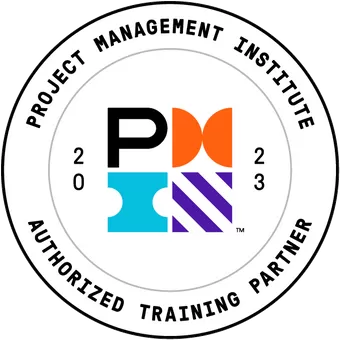
PfMP® Certification - Best Portfolio Management Professional Course
The PfMP® certification from PMI is for senior managers handling multiple programs and projects. Our course prepares you for this elite credential, highlighting your advanced portfolio management skills.
Choose Delivery Methods / Available Dates


--
--
60
--
Why Bakkah?
What is expected from this PfMP Course?
The PfMP Portfolio Management Professional course empowers you with the terminologies, skills, and strategic management frameworks you need when managing mega programs falling under one portfolio. Hence, you will study several resources published and approved by PMI.
By the end of this training course, you will obtain the below objectives:
- Overseeing the success of one or more portfolios
- Aligning the opponent approaches and demands of the different departments in programs & projects
- Allocating resources based on organizational priorities and capacities
- Adopting to achieve sustainable strategic objectives
- Gaining a distinct advantage by holding a prestigious certificate like PfMP
- Acquiring solid knowledge of Performance Management, Risk Management, and Strategic Governance Management
- Developing portfolio management life cycle
- Obtaining a strategic skillset where you develop portfolio management strategic plans & portfolio charters, and roadmaps while aligning the 3 deliverables with the strategic goals of the organization
- Setting crystal clear strategic-fit criteria for projects selections
- Developing the necessary portfolio artifacts along with project management artifacts
Who Needs to get the PfMP Certification?
- Professionals with 8 years of project and program management experience
- Portfolio Managers
- Program Managers
- Executive or Senior-Level Practitioner
- Senior Project Managers
- Chief Project Officers
- Associate Directors
- Project Management Officers, Executive Managers.
Skills Acquired from This Portfolio Management Professional Course:
- Strategic portfolio management planning
- Strategic planning processes, tools, and techniques
- Business analysis
- Interdependency analysis
- Prioritization analysis techniques
- Procedures to identify risk tolerance
- Organizational risk tolerance
- Structural risk analysis - portfolio and mission
- Organizational Structure
- Portfolio balancing
- Aggregate risk assessment and evaluation
- Decision Making and other various skills.
Live Online PfMP Training Course:
- Online Course Duration: 5 Days
- Exam Simulation
- Group Activity (Break-out Session) after each lesson
- Practice Test
- Access to additional References – Portfolio Management Glossary/ Recommended Reading
- The material language will be English
PfMP Certification Exam Requirement:
Without a four-year degree:
- You must acquire a minimum of 8 years of professional business experience
- Completion of at least 7 years of unique non-overlapping professional portfolio management experience
With a Four-year degree:
- You must acquire a minimum of 8 years of professional business experience
- Completion of at least 4 years of unique, non-overlapping, professional portfolio management experience
With a degree from a GAC-accredited program:
- You must acquire a minimum of 8 years of professional business experience
- Completion of at least 3 years of unique, non-overlapping, professional portfolio management experience
PfMP Exam Protocol
- Strategic Alignment – 25%
- Governance– 20%
- Portfolio Performance – 25%
- Portfolio Risk Management – 15%
- Communications Management – 15%
PfMP Exam Format
- PfMP is initiated with a panel review
- The specified time for examination 4 Hours
- The total number of exam questions is 170
- The PfMP exam contains multiple choice
- Number of scored questions (150)
- The number of questions of a pre-test that is unscored is (20)
- You can apply to the PfMP exam via the PearsonVUE platform
PfMP Certification Maintenance Requirements
Must earn 60 PDUs per three-year cycle to maintain certification.
Exam Simulators: 3 Sets
Total Questions: 510 Questions – 170 Questions per Exam Simulator
Time Allotted for Each Exam Simulation: 4 Hours
Pass Percentage: 70%
Includes: Exam Outline and Additional Study Resources
Resources: Tips and guidance to prepare effectively for the exam
The language will be English.
Course Inclusions
Introduction
- Purpose of The Standard for Portfolio Management
- What is a Portfolio?
- What is Portfolio Management?
- Relationship between Portfolio Management, Program Management, Project Management and Organizational Project Management
- Portfolio Management and Organizational Strategy
- Business Value
- Portfolio Component Management Relationships
- Role of the Portfolio Manager
- Role of PMO in Portfolio Management
- Portfolio Management Body of Knowledge
Portfolio Management Overview and Organization
- Portfolio Management and Organizational Strategy and Objectives
- Portfolio Management Process Implementation
- Portfolio Management Process Cycle
- Portfolio Management Information System (PMIS)
- Portfolio Management Governance
- Portfolio Stakeholders
- Organizational influences on Portfolio Management
Portfolio Management Process Groups
- Portfolio Management Process Groups
- Portfolio Management Process Interactions
Portfolio Strategic Management
- Develop Portfolio Strategic Plan
- Develop Portfolio Charter
- Define Portfolio Roadmap
- Manage Strategic Change
Portfolio Governance Management
- Develop Portfolio Management Plan
- Define Portfolio
- Optimize Portfolio
- Authorize Portfolio
- Provide Portfolio Oversight
Portfolio Performance Management
- Develop Portfolio Performance Management Plan
- Manage Supply and Demand
- Manage Portfolio Value
Portfolio Communication Management
- Develop Portfolio Communication Management Plan
- Manage Portfolio Information
Portfolio Risk Management
- Develop Portfolio Risk Management Plan
- Manage Portfolio Risks
For Business
Empower Your Team with World-Class Corporate Training
Tailored learning experiences for businesses of all sizes. Boost productivity, close skill gaps, and unlock your team's full potential with Bakkah globally accredited programs.
FAQs
Through Bakkah, you can easily purchase the exam voucher. However, the registration and examination processes are handled directly between the trainee and the accreditation body. As an accredited partner, we can provide support whenever needed, but are not responsible for issues related to technical problems, scheduling, or your exam readiness.

